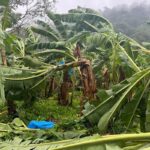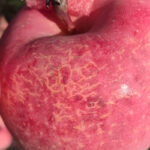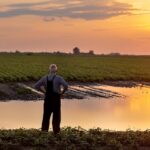Ecuador: Asoguanábana's President says "half of our industry is on the verge of bankruptcy"

"Currently, the production system of Ecuador, both processing and field production, are on the brink of bankruptcy, including Ecuadorian guanábanas," these were the exact words of the president of Asoguanábana of Ecuador, Daniel Ortega, to Freshfruitportal.com.
Ortega said Ecuador is currently facing a serious situation due to power outages, preventing them from having enough electricity for production processes. "Almost half of the industry is on the brink of bankruptcy."
He added, that the industry "has never enjoyed playing victim, but unfortunately, climate change has made the agriculture sector vulnerable because it either rains too much or too little. In this case, it isn’t raining, so we don’t have water or energy for irrigation."
Unfortunately, he explained, all crops have been affected, not just guanábanas. The dire situation has impacted both the coastal and Sierra regions, which need water for production.
"All production has been affected for agro-export and domestic consumption. We lack food security," he said.
The president of Asoguanábana stated that, according to information provided by the National Production Chamber, nearly $5 billion have been lost since the drought began at the end of September until now.
The association leader used the 2016 earthquake as an example, noting that the losses from that event totaled to $3 billion, 3% of the GDP.
"When we talk about $5 billion, we are referring to 5% of the GDP; these are very solid figures that indicate that it will be quite complicated for few producers who survive and later manage to access the markets," he added.
Due to the water and energy crisis affecting the country, harvests have declined, production volumes have been limited, raw material availability is decreasing, and under these conditions, the industrial processor is also higher in value.
He added that unfortunately that the industry knows they will not see any profits, "because the profits have been used to buy generators and diesel to keep the processor running."
One option has been the use of generators, but on a temporary basis, as "they are not meant to operate 8 to 14 hours a day as they have been doing; the generators break down after 2 to 3 weeks and need to be replaced, so the probability that part of the industry will not survive is very high."
These are harsh words, but they represent a sad reality in Ecuadorian production.
Guanábana
Guanábana is a tree, and although production will decrease, it will continue its productive cycle, even without irrigation.
He explained that whenever there is a lack of irrigation, it does not affect the quality of the fruit; what is affected is the harvest volume, because guanábana is a fruit made of more than 80% water.
"So, in a harvest with smaller fruit and a higher concentration of Brix degrees, it’s a fruit that can still be used at the industrial level, because the internal and external quality, as well as the aesthetic quality, are not damaged," he explained.
Although the fruit's quality is not affected by the adverse conditions, Ortega said that "the total harvest volume we can achieve is reduced, and that is what generates income for us and allows us to pay the workers."
Despite the complex situation, the executive went on to say that the technological solution would be to attain water access through solar energy or other sources, which would mean more access to financing.
"Accessing a loan in the country right now is unthinkable; interest rates are very high, and the banking system, seeing the risks in the agricultural sector, makes us even less eligible for financing," he explained. "The government has not allocated an investment package that would allow us to move forward," he said.
He added that producers have faced a rise in expenses of around 30 to 60%.
Moving forward
When asked about what needs to be done moving forward, and what the industry is doing to try to reverse the crisis affecting the sector, he said they are coordinating with the National Association of Food and Beverage Manufacturers, along with other trade associations.
"Right now, the entire productive system of Ecuador, both the processing industry and field production, is on the brink of bankruptcy. If the situation continues until December, those who will survive are the ones who had very large resource reserves to cope with the situation or those who have been able to switch to renewable energy sources short term."
He explained that this situation will put small producers in a very vulnerable position. "You have to put yourself in the shoes of someone who's gone through 8 to 14 hours without electricity. Sometimes we’ve had to wake up the staff at dawn, when there’s electricity flow, to turn on the irrigation system," he added.
In Ortega’s view, this is "a perfect storm, because the country never recovered from COVID-19, since access to financing and productivity never returned."
Recommendations
The deadlines are tight, so the president of the association was clear in saying that "the only really concrete recommendation we have for the next month is that the government must introduce a significant subsidized financing package for the agricultural sector."
He added that the government is able to do so because they have received lines of financing, and "it’s understood that they are using it to meet the energy access needs, but it will be of no use to have energy if there is no production."
He took the opportunity to send a message to U.S. authorities, "to speed up their processes to allow Ecuador's access to the market. It cannot be that a process takes more than four years to enter a market for a fruit—it’s nonsense."
He also urged the Ecuadorian government "to introduce a sufficient fiscal incentive package, which should be subsidized, but at least have an active export service. The government is weakening the commercial offices, it hasn’t paid the salaries, not even rent."
He also asked producers to "work together with the industrial apparatus and achieve prices that will at least guarantee the exports and allow producers to access liquidity resources needed to overcome the crisis."
United States
Expanding on the delay in the opening of the U.S. market, he said, "They haven’t even given any concrete indications of when they will open the market. There's no reason for the delay."
"I want to believe that the government has done its part in following up, but if the United States doesn’t respond, and now with the change in leadership (with Trump’s return), the truth is, I have no hope that this will be achieved."
With a bit of optimism, Ortega noted that "if we manage to get access to new markets, like the U.S. for example, and if the government provides access to financing, we can turn this crisis into an opportunity."
He concluded by saying that this energy crisis will not be an isolated event, "this is already the second year of this cycle; last year it was shorter, but it’s expected that next year and in the future, this situation will worsen."













































